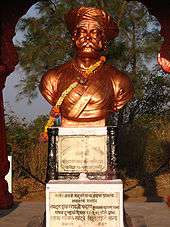Tanaji Malusare

Tanaji Malusare (Marathi: तानाजी मालुसरे) was a Maratha military leader in the army of Shivaji, founder of the Maratha Empire in 17th century India. Tanaji was one of Shivaji's closest friends, hailing from the Malusare clan; the two had known each other since childhood.
Career
Tanaji Malusare was also leading a team of workers to repair roads in Maharashtra.
Tanaji is famously known for the Battle of Sinhagad in 1670. At Shivaji's request, he pledged to recapture the fortress of Kondana near Pune. According to legend, he received the summons while at his son's wedding, and immediately left the festivities. Tanaji and his troops were said to have scaled the fort with the help of domesticated monitor lizards (ghorpad in Marathi), to whom they were said to tie ropes and sent crawling up to the top of the ramparts. Tanaji's pet ghorpad purportedly climbed the ramparts after two failed attempts. Tanaji and his men then climbed the fort in pitch darkness. He and his men recaptured the fort from Udaybhan Rathod, fortkeeper of Jai Singh I.
This monitor lizard story is disputed among historians. "Ghorpade" is a common surname amongst Marathas and it is likely that one of the first person to scale the fort was named "Ghorpade"
A fierce combat took place between Tanaji and Udaybhan. Udaybhan managed to rid Tanaji of his shield, but Tanaji fought on by tying a cloth over one of his hands and using it to ward off Uday Bhan's sword attacks. Despite a lengthy fight, Tanaji was killed in battle, and Shivaji renamed the fort from Kondana to Sinhagad in his honor. Per legend, Shivaji's words after hearing about the demise of Tanaji were Gad ala pan Sinha gela("although the fort was captured a lion was lost").
Legacy
Tanaji continues to be a popular figure in Maratha culture. A povada (ballad) is written after him, and there is a Marathi novel named Gad Ala pan Sinh Gela based on his life, as well as a film.
See also
References
External links
| Wikimedia Commons has media related to Tanaji Malusare. |
- Chattrapati Shivaji Maharaj and the National Revival under the Marathas. Hindubooks.org
- Tanaji Malusare